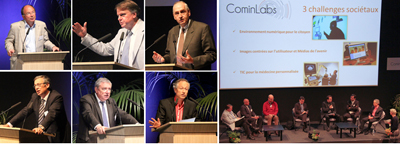News Story
Baras delivers keynote address at Labex Comin Labs opening

Photos courtesy of INRIA: "The laboratory of excellence COMIN Labs' Communication and Information Science Laboratories was officially launched Wednesday, June 8, at INRIA Campus de Beaulieu, University of Rennes 1. Over 100 participants attended the day. The morning began with an opening by officials, including the prefect Michel Cadot of Britain and President of the UEB Guy Cathelineau. It was followed by a panel discussion moderated by journalist Anne Chevrel. The afternoon was devoted to scientific presentations, with in particular the intervention of John Baras, University of Maryland."
The CominLabs are an initiative selected as part of the “Laboratoires d’Excellence” program by the French ministry of research and education. It gathers the best teams from Bretagne and Nantes regions in the broad area of telecommunications, from electronic devices to wide area distributed applications “over the top.” The scope of CominLabs covers research, education, and innovation. While being hosted by academic institutions, the CominLabs build on a strong industrial ecosystem made of large companies and competitive SMEs.
The Director of the new Comin Labs is Albert Benveniste, who is a member of the ISR Strategic Advisory Council. Baras was also selected to be the chairperson of the International Advisory Board of Comin Labs. It is expected, and indeed planned, that Comin Labs and ISR will collaborate in several technical areas.
Baras’ lecture was entitled “Challenges and Opportunities for Future Broadband Networks: From Physical to Services to Social”, and its theme was broadband communication infrastructures and their affecting of every aspect of life and work. He described major challenges and opportunities in this critical area, from an integrated systems perspective. He described how hardware and physical layer advances will make possible new programmable types of networks and services. In the wireless arena physical layer advances mitigate interference and will provide energy and bandwidth efficient and reliable communications. Services over the Future Internet and associated architectures are rapidly expanding and are increasingly interacting and integrated. Yet viewing these developments from a systems synthesis perspective lies in the future.
A major challenge is to be able to synthesize communication and information networks so as to meet in a predictable manner specifications. Key to the proposed research is the systematic development of components, component architectures and associated validation methodologies. Social networks over the web are also becoming ubiquitous and pose a unique set of challenges stemming primarily from the interactions of humans and technological networks. The emphasis of his lecture was on an integrated systems perspective and the need for appropriate model-based analytics.
He closed by presenting an integrated model of the communication, information and cognitive layers of future networks and a description of certain foundational problems this model implies for networked systems.
Published June 9, 2011





